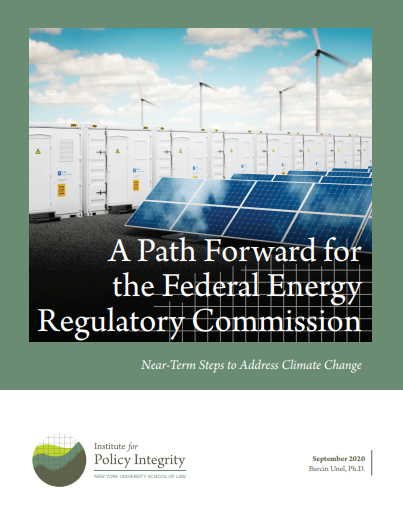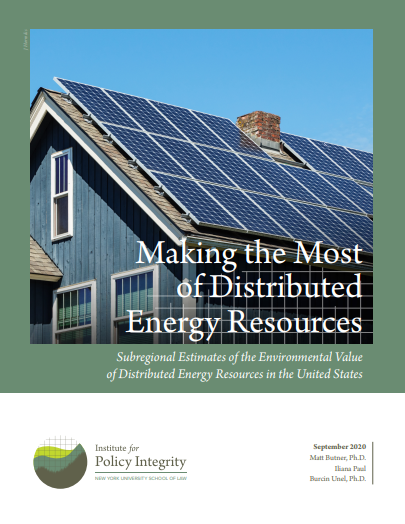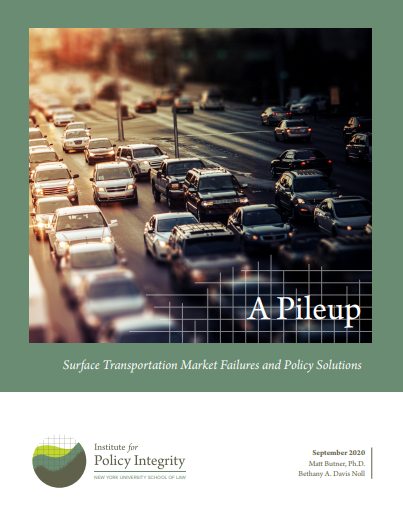-
Amicus Brief in Appeal of Conscience Protections Decision
Last fall, three federal courts—in the Southern District of the New York, the Northern District of California, and the Eastern District of Washington—vacated the Department of Health and Human Services’ conscience rule, which sought to expand healthcare providers’ rights to deny care on religious or moral grounds. In amicus briefs supporting the vacatur, Policy Integrity criticized HHS for, among other things, failing to consider the new policy’s likely health costs for women and LGBT individuals.
-
Comments to EPA on Airplane Emissions Regulations
The Environmental Protection Agency (EPA) proposed airplane pollution standards that have no effect on emissions and require no technological improvements. EPA does analyze one scenario in the technical support for the proposal, however, that appears to have modest greenhouse gas emissions reduction effects. But the agency improperly monetizes and weighs those reductions. We submitted joint comments that detail flaws in EPA’s analysis and describe how the agency can correctly apply the social cost of carbon.
-
Comments to Arizona on Integrated Resource Planning
The Arizona Corporation Commission regularly requires that load serving entities (LSEs), which supply electricity to ratepayers, file plans with a 15-year time horizon disclosing environmental impacts from different resource mixes and how they will address those impacts. We submitted comments encouraging the Commission to ask that LSEs provide monetized estimates of the damages they expect to result from greenhouse gas emissions using the social cost of carbon.
-
Comments to FWS on Critical Habitat Designations
The Fish and Wildlife Service (FWS) proposed amendments to its regulations for designating critical habitat. Several of FWS’s changes are inconsistent with the best practices for weighing the costs and benefits of agency action. We submitted comments explaining how the proposal is flawed in multiple ways and should not be finalized.
-
Comments to Department of Labor on Shareholder Proxy Voting Rule
A rule proposed by the Department of Labor would limit the shareholder rights of Employee Retirement Income Security Act (ERISA) participants. The rule, in particular, would eliminate opportunities for ERISA fiduciaries to vote on Environmental, Social, and Governance (ESG) proposals that have long-term financial benefits for retirements plans. We worked with the Environmental Defense Fund to submit comments detailing the flaws of the Department’s rule.
-
A Path Forward for the Federal Energy Regulatory Commission
Near-Term Steps to Address Climate Change
The Federal Energy Regulatory Commission should take an active role in better aligning regulatory practices with climate policies, speeding up development of necessary transmission infrastructure, and reforming energy market rules. This report details the specific policy reforms that federal policymakers should pursue to take advantage of important opportunities energy markets can provide to combat climate change while ensuring an economically efficient and speedy clean energy transition.
-
Amicus Brief in SDNY on Healthcare Nondiscrimination Rule
A rule by the Department of Health and Human Services would narrow the scope of civil rights protections for patients under the Affordable Care Act. We filed an amicus brief in the U.S. District Court for the Southern District of New York explaining how HHS fails to acknowledge, let alone weigh, the significant social harms resulting from the rule.
-
Making the Most of Distributed Energy Resources
Subregional Estimates of the Environmental Value of Distributed Energy Resources in the United States
This report provides a new set of hourly E-Values for the whole United States, broken down into 19 subregions, using an open-source reduced-order dispatch model. The patterns uncovered by these estimates can help policymakers design economically efficient DER policies to reduce air pollution from electricity generators.
-
A Pileup
Surface Transportation Market Failures and Policy Solutions
Surface transportation market failures, including greenhouse gas emissions, local air pollution, traffic congestion, and traffic collisions, generate billions of dollars in economic harm every year. Guided by economic principles, this report outlines several options for reforming U.S. surface transportation that account for technological, institutional, and political realities. It also highlights the unequal burden of market failures in the transportation sector and discusses policy solutions that can help lead to more just outcomes.
-
Comments to DOE on Energy Conservation Analysis for Air Conditioners
The Department of Energy (DOE) requested input on the analytical framework, models, and tools that it is using to evaluate potential standards for room air conditioners. In the technical support document, DOE departs from recent practice by proposing to focus on the domestic-only “interim” social cost of greenhouse gases estimates. We submitted joint comments recommending that DOE should, as it has in the past, continue to monetize the full climate benefits of greenhouse gas emissions reductions, using the best available estimates, which were derived by the Interagency Working Group on the Social Cost of Greenhouse Gases.










